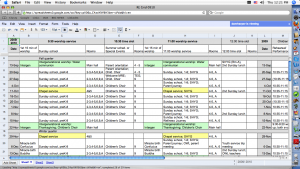Carol and I are reading Switch: How To Change Things When Change Is Hard, by two brothers, Chip Heath and Dan Heath; we both have jobs that call on us to implement social change, we both know how hard it can be to implement change, so we are both interested in new approaches to making change happen.
Switch starts with some basic human psychology: human beings are governed by both emotions and rational thought; human beings respond to the situations they find themselves in. Therefore, say the brothers Heath, to implement change we have to use both thoughts and feelings, and we have to create situations where change is easier rather than harder.
The second chapter of the book is titled “Find the Bright Spots” — but, they warn, finding bright spots is harder than it might seem. Human beings tend to focus on the negative aspects of life. To demonstrate this, they give a wonderful case study.
A pharmaceuticals company is having difficulty selling a new allergy drug. The company hires a consultant to help them figure out what’s going on. The consultant finds three saleswomen who are selling twenty times as much of the new drug as salespeople elsewhere. The consultant says to himself, “Ah, ha! there’s a bright spot. I’ll investigate that, and maybe I’ll learn how to improve sales elsewhere.” The consultant goes to investigate. He finds that these three saleswomen are teaching doctors and allergists how to administer the drug — it has to be administered intravenously, which is very unusual for allergy drugs. So he takes this finding back to the pharmaceutical company, and tells them that if they have their sale force start teaching doctors and allergists how to administer the drub, they’ll increase sales. And what does headquarters do? They refuse to believe in the bright spot, and they investigate the three saleswomen to find out why they have an unfair advantage over the other salespeople.
Recently, I discovered a bright spot in our congregational life here in the Palo Alto church. We are an introverted congregation; there are plenty of extroverts here, but the majority of us are introverts. But if I make public this bright spot (as I am, in fact, doing right now), I had better take into account the tendency of human beings to focus on the negative aspects of life. Like this imaginary conversation:
Ordinarily Negative Human Being: “What, we’re an introverted congregation?! That means no one will ever talk to newcomers!” Me: “Actually, that’s not true. We introverts excel at one-on-one conversations. We also do very well in structured social settings such as congregations.” ONHB: “We’re all introverts, no wonder we tend to be quiet in worship services!” Me: “Which means our quiet, mellow worship services well feel welcoming and calming to people whose lives are too crazy busy. Which is most everyone in Silicon Valley.” ONHB: “People will think we’re all geeks!” Me: “Umm, we are in Silicon Valley, half the population is geeks.” ONHB: “Oh yeah. Well, maybe it’s good we’re an introverted church.” Me: “I think so. I like our calm, peaceful church, where people have really interesting conversations, and where our worship style is calm and low-key. I like the fact that there are other geeks like me, including engineer geeks, science geeks, theology geeks, finance geeks, and many other kinds of people who are quietly passionate about things.”

